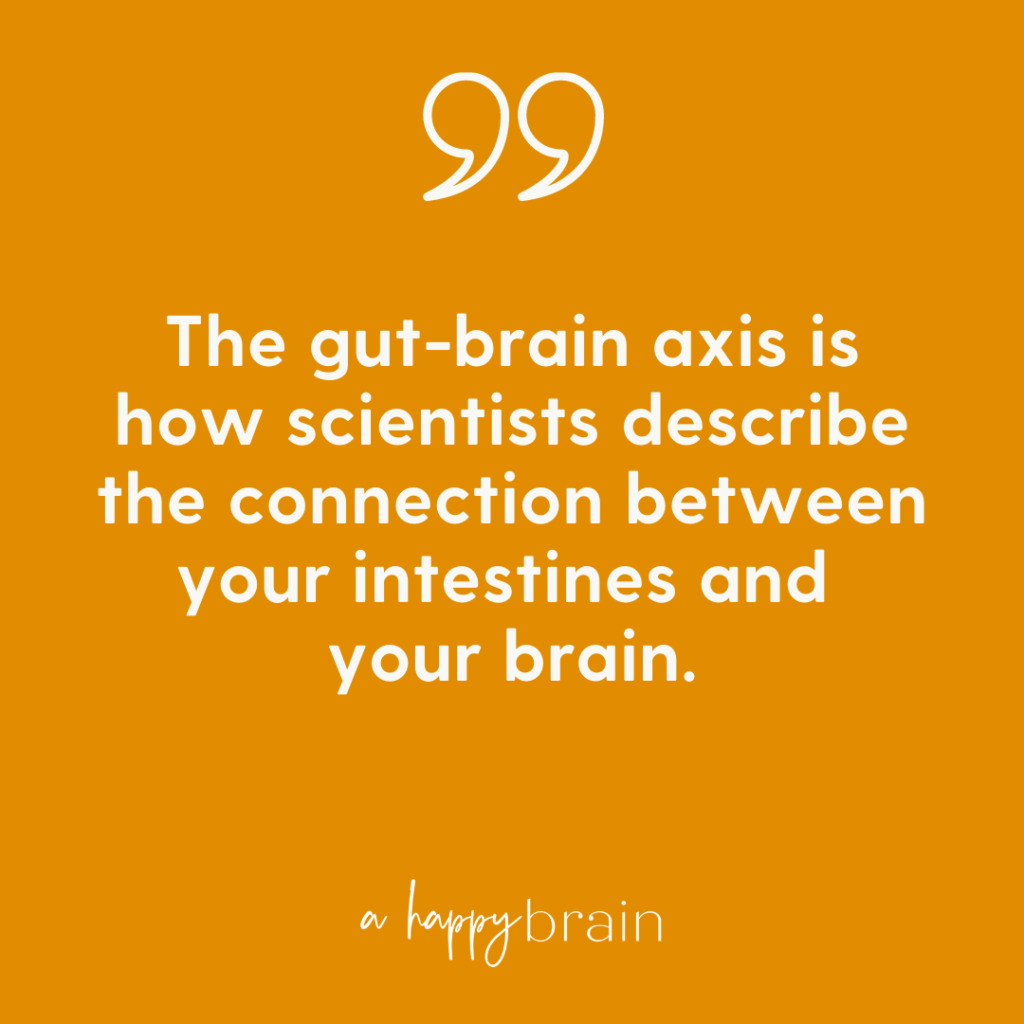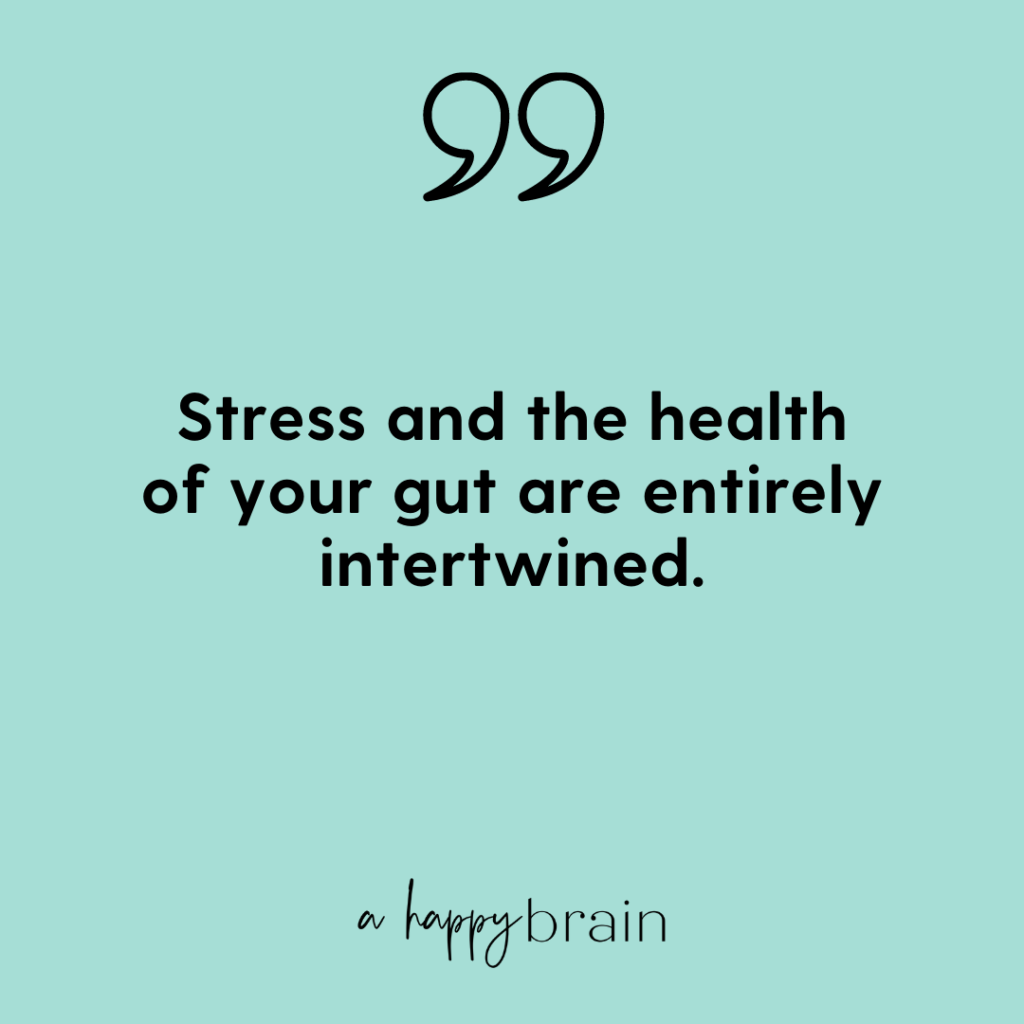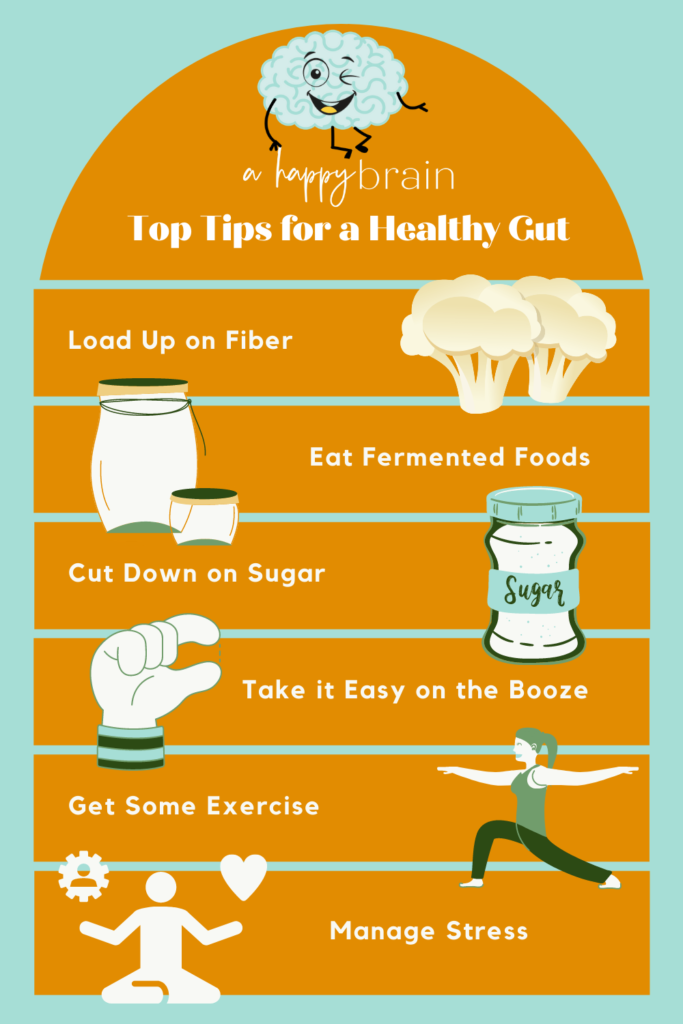Need the gut-brain axis explained simply? In this article, we cover what the gut-brain axis is, and what it does. In addition, we offer our top tips to keep this information highway healthy and functioning at its best.
Hello again, and welcome to the Happy Brain blog! This time around, I’m going to embark on a more in-depth exploration of the “gut-brain axis.” While this concept may be new to many of you, it’s getting more and more press.
Scientists describe the gut-brain axis as the “bidirectional communication between the central and the enteric nervous system, linking emotional and cognitive centers of the brain with peripheral intestinal functions”1. As simple as that! Get it? Me neither…
To put it a little more plainly, the gut-brain axis is how scientists describe the connection between your intestines and your brain. This isn’t as simple as when your belly tells your head it’s time to eat. In fact, modern research has found that there’s a surprisingly complex relationship between your digestive organs and what’s between your ears2.

Anyone remember Pavlov and his dogs? He conditioned those dogs to salivate at the sound of a metronome, in anticipation of the food he was about to give them. He found that the dogs’ brains processed the aural cue, and sent strong signals to the stomach to get ready for a feast. That experiment was some of the earliest research into the gut-brain axis.
Since a fascinating study on mice in 20043, there has been a renewed interest in this academic field. As a result, researchers have undertaken many studies to explore the gut-brain connection. They have studied how strong the connections between the brain and the gut are, and what exactly they do.
The Gut-Brain Axis Explained: A Healthy Gut Promotes a Healthy Brain
In other posts, I’ve mentioned the gut-brain axis without going into too much detail. I spoke about it in my article on sugar, where I explained that an overload of sugar can damage your gut’s fine balance4, which in turn has been shown to lead to anxiety and depression5.
When researching another article, this time on the Ketogenic diet and its effect on brain health, I learned that scientists have found strong links between the effects of a modified mediterranean-ketogenic diet on the micro-fungi living in your gut and the probability of developing Alzheimer’s disease as we age6.
One way the ketogenic diet might be helpful is that it significantly decreases the amount of gluten one eats. Gluten causes severe irritation in the intestines of those with celiac disease and NCGS (Non Celiac Gluten Sensitivity). This imbalance can lead to poor mental health, including depression7.
Suffice to say, what you ingest can definitely affect your gray matter! Today, let’s look at what exactly the connection is between these two fascinating organs…
How Gut Flora Influences our Brain and Behaviour
Your gut is full of life, without which you would struggle to survive. The term “gut flora” refers to the microorganisms that make their home in your gut. This biome may include 300-500 types of bacteria and various fungi.
These organisms allow you to digest food efficiently and extract all of the necessary nutrients8. They also form a very important element of your immune systems, and protect your body from “bad bacteria”, or pathogens. In short, they do a lot of heavy-lifting when it comes to keeping you (their welcoming host) healthy.
Amazingly, our gut flora, (also known as the gut microbiome) is with us from the moment we are born9. Now recent research has explored10 how this internal ecosystem impacts our mood, cognition, and behavior.
The Gut-Brain Axis Explained: Stress, the Gut, and the Brain
As I mentioned above, when you knock off the balance of the ecosystem in your intestines, your brain also feels the effects. The same is true for other influences on the body, such as stress.
Stress and the health of your gut are entirely intertwined11. Stress causes inflammation in the intestine, as well as an imbalance in the bacteria. At the same time, when we are stressed, we tend to eat and drink things which are not good for our digestion (sugar, alcohol, etc).
Studies have shown that stress early in life can cause long-term damage to your gut biome health. Additionally, they show that a healthy gut microbiome can actually protect infants against the effects of stress12.

The Gut-Brain Axis Explained: Top Tips for a Healthy Gut
Now that we know the importance of gut health for brain health, let’s take a look at what can we do to keep our gut in tip-top shape. In addition, let’s discuss how can we make sure the gut-brain communication is constructive and beneficial. Here are a few of my top tips…
Load Up on Fiber
We all know fiber is good for our digestion and bowels. However, it makes an impact on the health of our microscopic friends in our gut as well. Some plant fiber is know as “prebiotic.” This is because it feeds the good bacteria in your intestine. Your internal community thrives on fiber. Sources of fiber include berries, avocado, artichokes, onions, almonds, chia seeds, flax seeds, and garlic. All of these tasty foods have multiple health benefits, so don’t hold back!
Try Some Natural Probiotics
We’ve mentioned prebiotics, now let’s move on to a more common term—probiotics. Probiotics are live bacteria and yeasts which we can ingest. These microbes bolster your gut microbiome and improve its health. We can purchase probiotics in supplement for, or get them naturally in fermented foods. For example, fermented foods like kimchi, kombucha, yogurt and miso are loaded with gut-healthy microbes.
Cut down on Sugar
As we saw in my article on sugar, humans these days really overdo it. Too much sugar seriously damages your gut flora, leaving it unable to efficiently do its job. Drop the donut, and toss out the soda—your body will thank you for it.
Take it Easy on the Booze
Alcohol causes depletion of the good bacteria in your stomach13 over time. In addition, alcohol may contribute to a condition known as “leaky-gut.” This is a condition where food particles, proteins, and toxins can escape from your digestive system and get into your bloodstream. These foreign bodies in the blood can put your immune system on alert and cause sensitivities and allergies. Everything in moderation. people!
Get Some Exercise
Research has found that those who live a more sedentary lifestyle have a less diverse microbiome. So get out there and bust a gut (not literally) in the gym!

The Gut-Brain Axis Explained: A Simple Change of Approach
The changes that we can all make to improve the health of our gut flora aren’t challenging or costly. With only a few tweaks to our diet and lifestyle, we can ensure that the gut-brain axis is functioning at maximum efficiency. In addition, we can give our brain all the help it needs to stay happy and healthy for longer.
In future articles. I plan to explore which specific types of bacteria have been found to have the strongest connection with brain health. I look forward to seeing you there!
Dr. Annissa Slusher
References:
- https://www.ncbi.nlm.nih.gov/pmc/articles/PMC4367209/
- https://www.sciencedirect.com/science/article/pii/S2352289516300509
- https://www.ncbi.nlm.nih.gov/pmc/articles/PMC1664925/
- https://www.ncbi.nlm.nih.gov/pmc/articles/PMC7284805/
- https://www.ncbi.nlm.nih.gov/pmc/articles/PMC5641835/
- https://www.sciencedirect.com/science/article/pii/S2352396419305547
- https://onlinelibrary.wiley.com/doi/full/10.1111/apt.12730
- https://www.ncbi.nlm.nih.gov/pmc/articles/PMC5847071/
- https://www.amnh.org/exhibitions/the-secret-world-inside-you/microbiome-at-birth
- https://icds.uoregon.edu/wp-content/uploads/2011/07/CryanDinan2012_MindAlteringOrganisms.pdf
- https://www.ncbi.nlm.nih.gov/pmc/articles/PMC7213601/
- https://www.ncbi.nlm.nih.gov/pmc/articles/PMC4583334/
- https://www.sciencedirect.com/science/article/abs/pii/S152169181730118X
- https://pubmed.ncbi.nlm.nih.gov/30704343/


Thank you for this post. I’m really enjoying all the information you’re providing. Although I try to eat “healthy” by following all these suggestions, I’m having a hard time with fermented foods. My stomach does not react well to this type of food. Is that common?
Hi Maria,
Starting a new fermented food can cause a reaction. Often this might manifest as gas, bloating, and/or diarrhea. One cause of this is that the new microorganisms are at war with some of the less desirable species already in your gut. One way to prevent this is to start any new probiotic food very gradually, and increase slowly. This can cause the war between the microorganisms from getting too uncomfortable.
People with small intestine bacterial overgrowth (SIBO) might also have a reaction to fermented food. These people should work with a good naturopath to help balance out their microbiome.
I hope this helps!
-Annissa